The Editorial leftist Folio Weekly Was Too Afraid to Publish
Corporate Welfare Queens Bankroll Opposition to Amendment 4
by Mark David Major, AICP, The Outlaw Urbanist contributor
The opposition to Amendment 4 is using taxpayer money to try and stop you from having a voice in the future of where you live, work and play: our neighborhoods and towns. They are trying to silence your voice about the future of Florida’s growth and development. Home builders and their vassals are principally responsible for bankrolling millions of dollars in opposition to Amendment 4. The only argument they have is fear because no one (not even the home builders) has the political courage to defend the morally corrupt and intellectually bankrupt growth management process in the State of Florida over the last 30+ years. And the home builders are trying to scare you using your own money.
Do you want to talk about the audacity of audacity? Let’s follow the money.
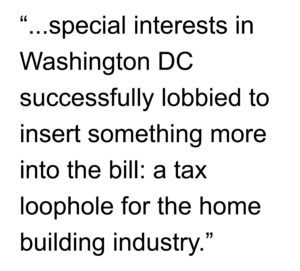 At the beginning of this year, the Democratic Congress passed and President Obama signed into law an extension of unemployment benefits compensation. So far, so good: right? But the special interests in Washington DC successfully lobbied to insert something more into the bill: a tax loophole for the home building industry. The national home builders were able to claim losses over the last 2 years against federal taxes on their corporate profits during the previous 5 years. Basically, this means the federal government is using deficit spending (by borrowing mainly from China, Japan and the United Kingdom) to refund corporate taxes on national home builders’ profits during the boom years to compensate for their losses during the Great Recession. Of course, it will be left to this generation and future generations of unborn Americans to pay this debt.
At the beginning of this year, the Democratic Congress passed and President Obama signed into law an extension of unemployment benefits compensation. So far, so good: right? But the special interests in Washington DC successfully lobbied to insert something more into the bill: a tax loophole for the home building industry. The national home builders were able to claim losses over the last 2 years against federal taxes on their corporate profits during the previous 5 years. Basically, this means the federal government is using deficit spending (by borrowing mainly from China, Japan and the United Kingdom) to refund corporate taxes on national home builders’ profits during the boom years to compensate for their losses during the Great Recession. Of course, it will be left to this generation and future generations of unborn Americans to pay this debt.
Let’s be clear. This is a “backdoor” government bailout: nothing more, nothing less.
But wait, there’s more. After receiving their bailout, the national home builders report the tax refund as profit to Wall Street, thereby maintaining the value of their shares. Most home builder shares lost more than 80% of their value during the financial crisis, broadly dropping from $35-45 a share to around $10 or less a share. Even with this backdoor government bailout, home builder share prices had only remained stable more or less near their historic lows. So, not only is the federal government propping up the obsolete business models of the home building industry that planted the seeds of this Great Recession in the first place (especially in Florida, California and Nevada) and not only is it also the means to artificially inflate home builder share value on stock market to create another “bubble” but it isn’t even working all that well. To any common sense American, this is a waste of money on an almost unimaginable scale.
Oh, and the unemployed? At the same time the home builders are receiving billions of dollars in backdoor government bailouts, the federal government taxes as income the unemployment compensation payments for the unemployed. This is the anti-Robin Hood economics of the perverse. Steal from the future earnings of the poor to bailout the rich today. 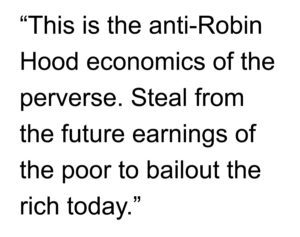 It is a house of cards waiting to fall all over again. And, once again, it will be left to the taxpayers to cover the bills.
It is a house of cards waiting to fall all over again. And, once again, it will be left to the taxpayers to cover the bills.
In the early 90s, Welfare Reform was a major legislative achievement of President Clinton and Newt Gingrich’s Republican Congress. It rolled back one of the worst abuses of Johnson’s Great Society programs by getting people off the welfare rolls and back into the workplace. At its core was the idea there is dignity in being able to work and stand on your own without government assistance. Now, we have the new phenomenon of the Corporate Welfare Queens. The banks, auto industry and, now, the home builders are just some who have been caught red-handed sucking at the teat of the federal government. How are these Corporate Welfare Queens any different from the welfare queens President Reagan used to describe as both an abuser and victim of the system? Well, for one thing, we are talking about corporations that are too stubborn, too beholden to their quarterly profit reports to Wall Street, who possess obsolete business models they are too cowardly or dense to change in order to address the new economic realities. They would rather stick their fingers in their ears and hum really loud (and insert their heads with the fingers plugging their ears into the sand, for good measure) rather than adapt their business models and methods. Corporations like this should be allowed to perish in a capitalist society. The innovators will survive and thrive. The dinosaurs will finally become extinct, as they should. Instead, the federal government is using corporate welfare to pervert the marketplace and these obsolete industries are as happy as pigs at the trough. Today, what we clearly need is Corporate Welfare Reform.
So what does this have to do with Amendment 4? The home building industry has bankrolled 40% of the funds raised to oppose Amendment 4. The rest of the funds raised to oppose Amendment 4 largely come from businesses/organizations providing support services – and receiving income – from the home builders. Amendment 4 is a ballot initiative designed to give voters a say on major changes to their community’s future land use map; specifically, how our neighborhoods and towns in Florida will grow in the future. They want to deny you a voice in your future.
Many voters are old enough to remember the Watergate adage, “follow the money.” If you do, it’s easy to see they are using your money to tell you to shut up. But this is our Florida. 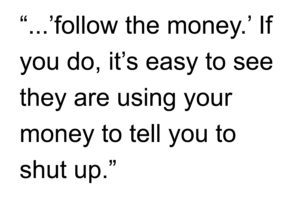 They may have more money (even if a part of it was stolen from you) but there are more of us. Nothing can stop the power of The People when they decide to act (see the Revolutionary War against King George and the British Empire for a relevant example). Let your voices be heard loud and clear this November 2nd. Vote YES on Amendment 4.
They may have more money (even if a part of it was stolen from you) but there are more of us. Nothing can stop the power of The People when they decide to act (see the Revolutionary War against King George and the British Empire for a relevant example). Let your voices be heard loud and clear this November 2nd. Vote YES on Amendment 4.
Tea, anyone?
Mark David Major, AICP is a certified planner of the American Institute of Certified Planners, a former planner for a national home builder and former Chair of the First Coast Section, Florida Chapter of the American Planning Association from 2005-2008.
This editorial was originally written October 26, 2010 and submitted to Folio Weekly for their back page editorial. It was never published and Amendment 4 was defeated by 67% of the vote in the November 2010 election. The scare tactics employed by the home builders, government officials, and real estate and planning professionals to defeat Amendment 4 was instrumental in driving up vote turnout and electing the current unpopular Republican Governor of Florida, Rick Scott. Today, the Florida real estate market remains vastly overbuilt with inventory on life-support. You reap what you sow. Don’t believe the bizarre rants and maniacal claims of real estate agents about a “hot” real estate market. They are lying to you.


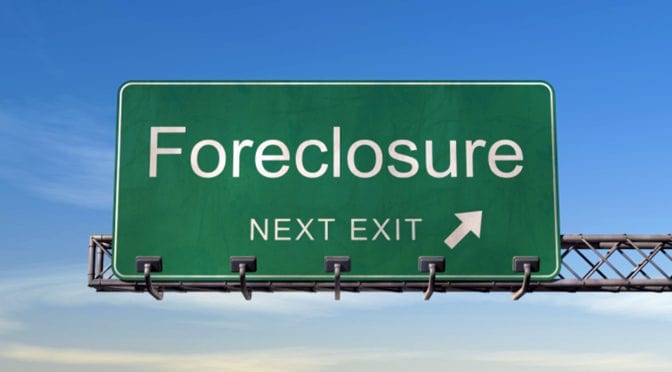
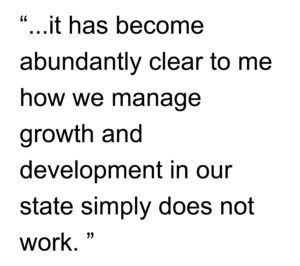 Even those who opposed Amendment 4, openly admit it does not work. And you don’t have to take their word for it either.
Even those who opposed Amendment 4, openly admit it does not work. And you don’t have to take their word for it either.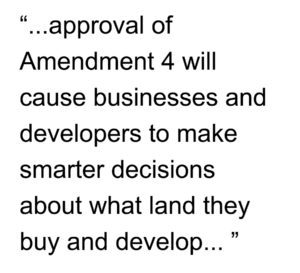 This will lead to smarter growth in Florida.
This will lead to smarter growth in Florida.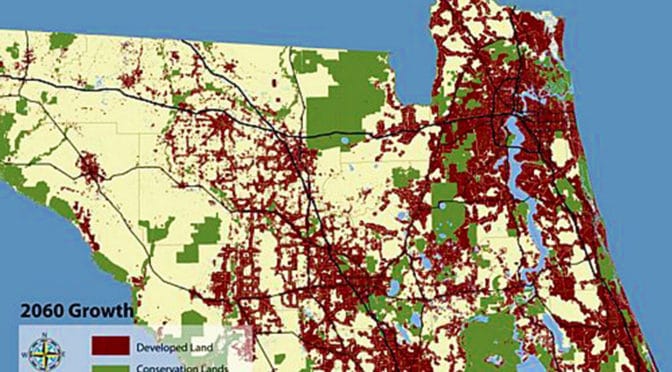
 And this will lead to real change in how Florida develops and grows, for better and smarter development, in the future. Once the inevitable economic recovery appears, our real estate and development businesses will still make money (a lot of money, in fact). But the “this is the way we’ve always done it” business models they have relied for the last 25+ years will have to adapt when the voters approve Amendment 4 this November 2nd. Americans are optimists. We believe a vote can change our world. In 2006 and 2008, we voted to change direction after the Republican Party betrayed its core principles. Now, in 2010, we are once again preparing to vote for unprecedented change after the disappointment of the last 2 years. The media pundits and talking heads are pontificating about “the angry voter”, as represented by the enthusiasm of the Tea Party movement. But people don’t get angry and enthusiastically go out to vote unless they are optimists. The optimist votes because we still believe our vote matters and we can change things for the better. We stubbornly cling to our optimism despite being bombarded by the ‘conventional wisdom’ of cynics who prey on the fear we can never change a corrupt system dominated by moneyed interests, lobbyists and entitled self-serving incumbents (of both parties). I urge you to exercise your optimism by voting Yes on Amendment 4 this November 2nd for a better and smarter Florida.
And this will lead to real change in how Florida develops and grows, for better and smarter development, in the future. Once the inevitable economic recovery appears, our real estate and development businesses will still make money (a lot of money, in fact). But the “this is the way we’ve always done it” business models they have relied for the last 25+ years will have to adapt when the voters approve Amendment 4 this November 2nd. Americans are optimists. We believe a vote can change our world. In 2006 and 2008, we voted to change direction after the Republican Party betrayed its core principles. Now, in 2010, we are once again preparing to vote for unprecedented change after the disappointment of the last 2 years. The media pundits and talking heads are pontificating about “the angry voter”, as represented by the enthusiasm of the Tea Party movement. But people don’t get angry and enthusiastically go out to vote unless they are optimists. The optimist votes because we still believe our vote matters and we can change things for the better. We stubbornly cling to our optimism despite being bombarded by the ‘conventional wisdom’ of cynics who prey on the fear we can never change a corrupt system dominated by moneyed interests, lobbyists and entitled self-serving incumbents (of both parties). I urge you to exercise your optimism by voting Yes on Amendment 4 this November 2nd for a better and smarter Florida.
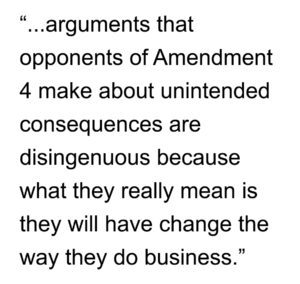 But it is ‘business as usual’ that is the problem. Approval of Amendment 4 will lead to businesses making better and smarter decisions about what land is best to develop rather than what is the cheapest land to purchase. The most crucial calculations about a development are made long before it enters the regulatory process and approval of Amendment 4 will alter those calculations.
But it is ‘business as usual’ that is the problem. Approval of Amendment 4 will lead to businesses making better and smarter decisions about what land is best to develop rather than what is the cheapest land to purchase. The most crucial calculations about a development are made long before it enters the regulatory process and approval of Amendment 4 will alter those calculations.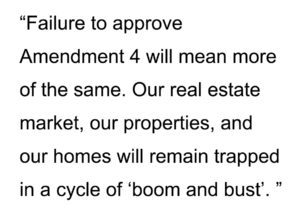 More importantly, the solution opponents of Amendment 4 are offering is ‘more of the same’. They are poised, even eager, to make the same mistakes all over again because that is “how we’ve always done it”. But ‘more of the same’ is not a solution. Voting YES for Amendment 4 this November 2nd is a step in the right direction for a better Florida.
More importantly, the solution opponents of Amendment 4 are offering is ‘more of the same’. They are poised, even eager, to make the same mistakes all over again because that is “how we’ve always done it”. But ‘more of the same’ is not a solution. Voting YES for Amendment 4 this November 2nd is a step in the right direction for a better Florida.
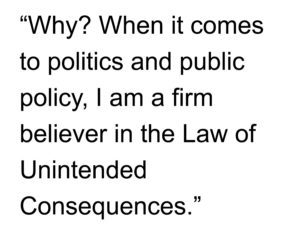 This will impose “de facto” urban growth boundaries on our settlements. Since I moved to Florida in 2002, I have advocated the adoption of urban growth boundaries as a powerful tool to better manage growth in the state. The typical response from elected officials and public sector planners has been a raised eyebrow. Once, an elected official even reacted of my advocacy of urban growth boundaries as “communistic”, which is ironic since I was once accused of being a “fascist” planner in Europe during the 1990s. Urban growth boundaries can be used to direct growth away from typical post-WII suburban sprawl, greenfield developments to instead promote: brownfield development, historic rehabilitation, urban redevelopment, adaptive re-use of building stock and traditional neighborhood development; increased densities to support mixed-use communities and consolidate vehicular trips; the viability of alternative modes of transport (walking, biking, street cars, bus, rail, etc.); and, the preservation of rural lands. Voting YES on Amendment 4 with serendipitously thrust one of the most powerful tools for growth management into the laps of our public planning agencies (thank you very much). The fact is most of our elected leaders do not have the political courage to adopt this tool. Consequently, many of our public planners fail to advocate
This will impose “de facto” urban growth boundaries on our settlements. Since I moved to Florida in 2002, I have advocated the adoption of urban growth boundaries as a powerful tool to better manage growth in the state. The typical response from elected officials and public sector planners has been a raised eyebrow. Once, an elected official even reacted of my advocacy of urban growth boundaries as “communistic”, which is ironic since I was once accused of being a “fascist” planner in Europe during the 1990s. Urban growth boundaries can be used to direct growth away from typical post-WII suburban sprawl, greenfield developments to instead promote: brownfield development, historic rehabilitation, urban redevelopment, adaptive re-use of building stock and traditional neighborhood development; increased densities to support mixed-use communities and consolidate vehicular trips; the viability of alternative modes of transport (walking, biking, street cars, bus, rail, etc.); and, the preservation of rural lands. Voting YES on Amendment 4 with serendipitously thrust one of the most powerful tools for growth management into the laps of our public planning agencies (thank you very much). The fact is most of our elected leaders do not have the political courage to adopt this tool. Consequently, many of our public planners fail to advocate 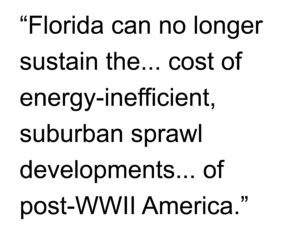 However, Florida can no longer sustain the personal or public cost of energy-inefficient, suburban sprawl developments so characteristic of post-WWII America (and especially here). The business and planning models of our real estate industry are dinosaurs and need to evolve lest they become extinct. Voting YES on Amendment 4 will force the real estate industry to think outside of the “easy money, lazy thinking” box it has been trapped for the last 30 years. Americans are incredibly clever and creative innovators when they decide to be (especially when it comes to business and profit). Voting YES on Amendment 4 will firmly set the brightest minds of our business and political leadership to the task of innovating the real estate industry for a more sustainable future. Personally, I find this to be a very exciting challenge. The alternative is founded on fear of the unknown and the conceit we are forever trapped in the bubble cycle of ‘boom and bust’. I don’t believe it.
However, Florida can no longer sustain the personal or public cost of energy-inefficient, suburban sprawl developments so characteristic of post-WWII America (and especially here). The business and planning models of our real estate industry are dinosaurs and need to evolve lest they become extinct. Voting YES on Amendment 4 will force the real estate industry to think outside of the “easy money, lazy thinking” box it has been trapped for the last 30 years. Americans are incredibly clever and creative innovators when they decide to be (especially when it comes to business and profit). Voting YES on Amendment 4 will firmly set the brightest minds of our business and political leadership to the task of innovating the real estate industry for a more sustainable future. Personally, I find this to be a very exciting challenge. The alternative is founded on fear of the unknown and the conceit we are forever trapped in the bubble cycle of ‘boom and bust’. I don’t believe it.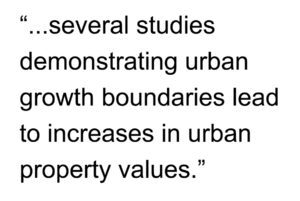 With Florida Hometown Democracy operating as a “de facto” urban growth boundary, a sustainable climb in urban property values will result. For rural, greenfield lands not entitled under local comprehensive plans, the land value should remain stable. The collapse of the residential/commercial real estate market in Florida during the Great Recession has already deflated land values so they have – more or less – bottomed out. This does mean property taxes on rural lands will remain low for their owners. And since Florida has a history of large, rural land ownership under the auspices of a single family or entity, any discernable deflation in rural land values will affect only a few rather than the many. Voting YES on Amendment 4 will be a boost for urban property owners, who represent the overwhelming majority of people in the state. Higher property values will also lead to increased tax revenues (without mileage hikes) for our local governments; stabilize and reignite the existing residential housing market in the state; and, reinvigorate access to credit as people’s home value rises.
With Florida Hometown Democracy operating as a “de facto” urban growth boundary, a sustainable climb in urban property values will result. For rural, greenfield lands not entitled under local comprehensive plans, the land value should remain stable. The collapse of the residential/commercial real estate market in Florida during the Great Recession has already deflated land values so they have – more or less – bottomed out. This does mean property taxes on rural lands will remain low for their owners. And since Florida has a history of large, rural land ownership under the auspices of a single family or entity, any discernable deflation in rural land values will affect only a few rather than the many. Voting YES on Amendment 4 will be a boost for urban property owners, who represent the overwhelming majority of people in the state. Higher property values will also lead to increased tax revenues (without mileage hikes) for our local governments; stabilize and reignite the existing residential housing market in the state; and, reinvigorate access to credit as people’s home value rises.